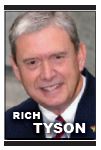Richard Tyson
One of the consistent blessings in my life and career has come from the courageous and caring counsel from coaches and mentors. Courageous by not sparing me the temporary pain of helping me see my shortfalls and opportunities for improvement, and caring in the kind manner they have shared those insights. I have grown from these relationships; they are among the most meaningful and important in my life.{mprestriction ids="1,3"}
My role for the past three decades has been serving as a coach to CEOs and business owners. My focus has always been to bring exceptional value to them as they strive to continuously grow as leaders. This has led me to regularly ask the question posed by the late business guru Clayton Christensen: “What job have I been hired for?”
This is not an easy question to answer.
A standard one-size-fits-all approach (although quite common) fails to acknowledge that every leader’s need is different, unique to his or her situation. Those who offer “standard coaching” are, by definition, prescriptive. They bring their expertise to the relationship.
In certain areas of business which are defined by regulation or generally accepted practices (such as law and accounting), this is not only appropriate; it’s essential. However, it’s important to recognize that the job for which these coaches are hired falls within specific boundaries. When they venture beyond those boundaries, they often exceed both their expertise and their ability to provide efficacious guidance.
Because the needs of leaders are incredibly diverse, a customized approach to coaching is also problematic. When I approach a new client, or a new situation with an existing one, I must acknowledge that, “I don’t know what I don’t know.”
This leads me to the only standard tool in my tool chest: asking questions. I must begin with curiosity, with a deep interest in zeroing in on the client’s problem, pain or opportunity. The key issue here is not to solve the client’s problem. Rather, it’s to develop a clear and deep understanding of what the client needs or wants. That is the initial and most important job for which I am hired.
Of course, the next job is to facilitate progress toward solutions for the client’s challenge or opportunity. However, even at this stage, moving to prescription is premature. More questions — and answers — are required to understand what has already been tried, what the perceived barriers are to moving forward, and what other options might be available. As the answers to these questions come to light, it is critically important to make sure we consider both the immediate situation as well as the long-term implications of possible strategies. I call this balancing “learning in the moment of need” with the leader’s long-range strategic goals.
As more clarity emerges, my job is to channel the client to those who can help develop the prescription that will provide the solution required. Sometimes, that falls within my areas of expertise; often it does not. For that reason, I have worked diligently over the years to build connections with a cadre of prescriptive coaches who can meet those needs when they emerge.
If you find yourself needing guidance in practices that are strictly governed by regulation or industry standards, I strongly recommend that you focus on those who coach prescriptively. If, however, you feel a need to strengthen your leadership skills, a seasoned facilitative coach is more likely to fit.
In selecting a coach, prescriptive or facilitative, I suggest that you seek someone who possesses the following attributes:
• They are learners. They continuously seek greater knowledge in both their area of expertise and the processes with which they use to serve others. They recognize they don’t know everything, and love to discover new insights they can use to serve others.
• They are questioners. They seek to understand before being understood.
• They are courageous and gently relentless. They recognize they often have the uncomfortable role of encouraging commitment where it doesn’t exist.
• They are “therefore,” “whaters” and “what’s nexters.” They focus on forward momentum.
• They follow up. They recognize that little progress is made without accountability.
• They are optimistic. They believe in the incredible potential of those they coach.
The benefits of having a coach are well-documented. Productivity, profits and job satisfaction have all been shown to correlate positively where strong competent coaches are utilized. The question, then, that each leader should ask is akin to that posed by Clayton Christensen: “What job am I looking for a coach to do for me?”
Once this question is answered, you can move forward in a search for the right coach who can help you reach your business goals.
Richard Tyson is the founder, principal owner and president of CEObuilder, which provides forums for consulting and coaching to executives in small businesses.{/mprestriction}








